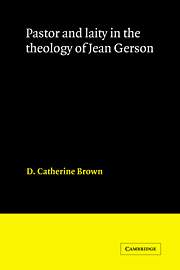Book contents
- Frontmatter
- Contents
- Preface
- List of abbreviations
- INTRODUCTION
- 1 GERSON'S LIFE
- 2 THE ART OF THE PREACHER
- 3 THE ROLE OF THE PASTOR
- 4 THE MEANS OF SALVATION
- 5 THE ANALYSIS OF SIN
- 6 THE MYSTICAL WAY
- 7 WOMEN, MARRIAGE AND CHILDREN
- 8 DOCTOR CHRISTIANISSIMUS ET CONSOLATORIUS
- Notes
- Bibliography of works cited
- Index
7 - WOMEN, MARRIAGE AND CHILDREN
Published online by Cambridge University Press: 20 October 2009
- Frontmatter
- Contents
- Preface
- List of abbreviations
- INTRODUCTION
- 1 GERSON'S LIFE
- 2 THE ART OF THE PREACHER
- 3 THE ROLE OF THE PASTOR
- 4 THE MEANS OF SALVATION
- 5 THE ANALYSIS OF SIN
- 6 THE MYSTICAL WAY
- 7 WOMEN, MARRIAGE AND CHILDREN
- 8 DOCTOR CHRISTIANISSIMUS ET CONSOLATORIUS
- Notes
- Bibliography of works cited
- Index
Summary
WOMEN
It has been assumed so far that Gerson's parishioners and the laity in general who had contact, direct or indirect, with his pastoral writings formed a homogeneous group. But half – in fact probably more than half – of these people would be women. Remarks made by some medieval preachers suggest that then, as now, women were more assiduous in their attendance at church and sermons than men. It cannot be taken for granted, however, that a late medieval pastor's attitude to and beliefs and teachings about the female members of his flock would be identical with those he held towards and about the male members. One would be nearer the truth if one assumed that he viewed women as inferior to men in some respects at least. Is this the position maintained by Gerson? What are his opinions and teachings on the ‘woman-question’ – a question which, in its literary form, became quite prominent in his lifetime with the outbreak of the controversy over the Roman de la rose around the turn of the century, and the querelle des dames during the following decades?
Gerson's position on women was not developed in a vacuum. It was strongly influenced by the theological tradition which he inherited: scriptural texts, the writings of the Fathers, the work of earlier theologians and canonists. The actual position of women in the society of his day and the attitudes taken to women in the literature of the medieval period no doubt coloured his thought, while his own experience of women possibly played its part.
- Type
- Chapter
- Information
- Pastor and Laity in the Theology of Jean Gerson , pp. 209 - 251Publisher: Cambridge University PressPrint publication year: 1987

